Best CRM for Supply Chain Management Services 2025

Why CRM Matters for Supply Chain Management in 2025
Supply chain operations have evolved dramatically, with customer expectations higher than ever. Modern supply chain management requires seamless coordination between sales, operations, and customer service teams. A specialized CRM system helps bridge these gaps by:
- Centralizing customer data across multiple touchpoints and delivery cycles
- Streamlining quote generation and order processing
- Enabling real-time tracking and updates for both teams and customers
- Automating follow-ups and communication throughout the fulfillment process
- Providing analytics to identify bottlenecks and optimization opportunities
With the right CRM solution, supply chain businesses can reduce administrative overhead, minimize errors, and deliver exceptional customer experiences that drive loyalty and growth.
Ready to Transform Your Supply Chain Operations?
Stop juggling multiple systems and start streamlining your customer relationships with a purpose-built CRM for supply chain management.
Top CRM Solutions for Supply Chain Management: 2025 Comparison
We’ve evaluated the leading CRM platforms based on their ability to address the specific needs of supply chain management services. Our analysis focuses on essential features like lead tracking, quotes & invoicing, scheduling & dispatching, mobile team coordination, and automation capabilities.
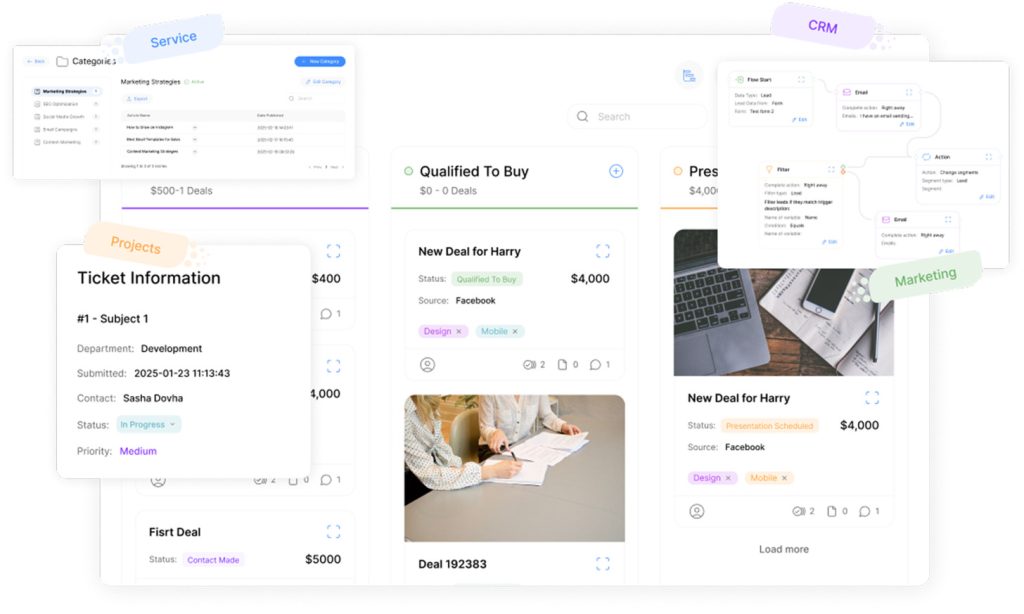
| Features | ClearCRM | Jobber | ServiceTitan | HubSpot |
| Unlimited Pipelines | ✓ | Limited | Limited | Premium tiers only |
| Supply Chain Workflow Automation | ✓ | Basic | Advanced | Limited |
| Mobile Team Coordination | ✓ | ✓ | ✓ | Limited |
| Quotes & Invoicing | ✓ | ✓ | ✓ | Add-on required |
| Scheduling & Dispatching | ✓ | ✓ | ✓ | Limited |
| Supply Chain Analytics | ✓ | Basic | Advanced | Limited |
| Customization Options | High | Medium | Medium | High (Premium) |
| Starting Price | $29/month | $69/month | $125+/month | Free (Limited), $45+/month |
Now, let’s dive deeper into each CRM solution to understand their strengths, limitations, and how they address the unique challenges of supply chain management.
1. ClearCRM: Purpose-Built for Supply Chain Management
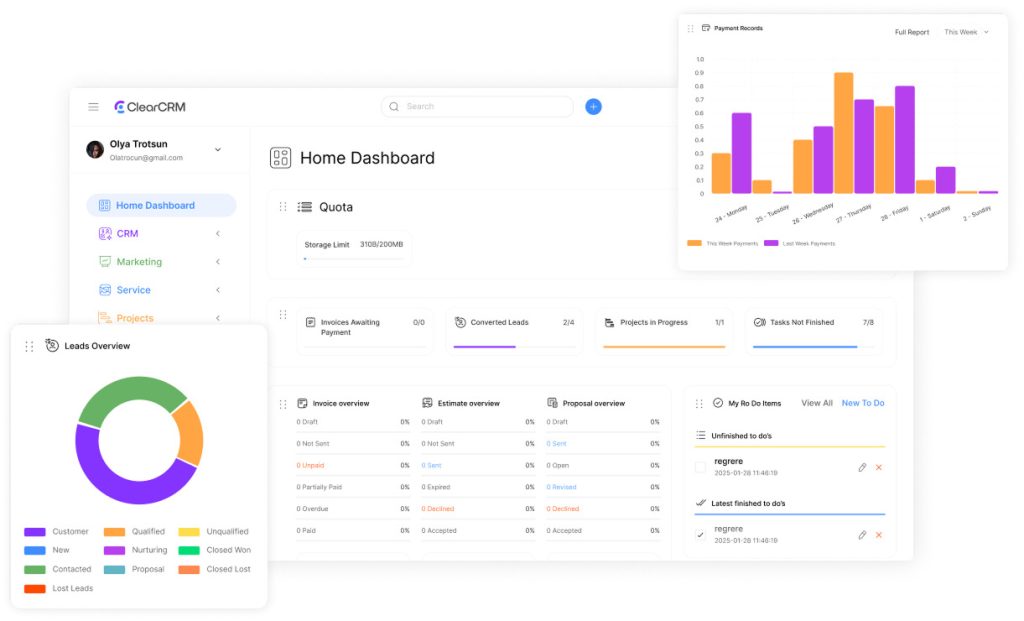
ClearCRM stands out for its powerful CRM capabilities, purpose-built to streamline supply chain operations and enhance customer visibility. Its intuitive interface and powerful automation capabilities make it particularly well-suited for businesses that need to manage complex customer relationships across extended delivery cycles.
Key Features for Supply Chain Management
- Unlimited Pipelines: Create custom pipelines for different products, services, or customer segments without additional costs.
- Workflow Automation: Use tools like workflow automation, lead scoring, and automated alerts to eliminate manual processes in your supply chain.
- Mobile Team Coordination: Keep field teams, warehouse staff, and office personnel in sync with real-time updates and task management.
- Customizable Dashboards: Monitor KPIs specific to your supply chain operations with tailored reporting views.
- Seamless Quotes & Invoicing: Generate professional quotes and convert them to invoices with minimal effort.
Pros
- Purpose-built for supply chain workflows
- Unlimited pipelines included in all plans
- Highly customizable without technical expertise
- Excellent value for feature set
- Intuitive interface requires minimal training
- Even on the base plan, ClearCRM includes advanced features like workflow automation, customizable dashboards, and mobile task management.
Cons
- Newer to market than some competitors
- Growing but smaller integration marketplace
- Advanced analytics require higher tier plans
Experience ClearCRM for Your Supply Chain
See how unlimited pipelines and purpose-built features can transform your customer relationships.
2. Jobber: Field Service Management with Supply Chain Elements
Jobber is primarily designed for field service businesses but offers several features that can be adapted for supply chain management. Its strength lies in scheduling, dispatching, and mobile team coordination.
Key Features for Supply Chain Management
- Scheduling & Dispatching: Visual calendar and dispatching tools to coordinate deliveries and service appointments.
- Mobile App: Robust mobile capabilities for field teams to access customer information and update statuses.
- Client Portal: Allow customers to track orders, approve quotes, and make payments online.
- Route Optimization: Plan efficient delivery routes to minimize travel time and fuel costs.
- GPS Tracking: Monitor team locations and provide accurate ETAs to customers.
Pros
- Excellent scheduling and dispatching tools
- Strong mobile app for field teams
- Good client communication features
- Intuitive user interface
Cons
- Limited pipeline customization
- Not specifically designed for supply chain workflows
- Fewer automation capabilities
- Higher starting price point
3. ServiceTitan: Enterprise-Grade Solution with Robust Features
ServiceTitan is a comprehensive platform designed for larger operations with complex workflows. While primarily focused on service businesses, it offers powerful features that can be adapted for supply chain management at scale.
Key Features for Supply Chain Management
- Advanced Scheduling: Sophisticated scheduling system with capacity planning and resource allocation.
- Inventory Management: Track parts and materials across multiple locations with real-time updates.
- Business Intelligence: Robust reporting and analytics to identify trends and optimization opportunities.
- Customer Experience: Tools to enhance the overall customer experience, including proactive communication, status updates, and streamlined support across every touchpoint.
- Integration Capabilities: Connect with accounting, ERP, and other business systems.
Pros
- Comprehensive feature set for complex operations
- Powerful reporting and analytics
- Strong mobile capabilities
- Robust customer communication tools
Cons
- Significant investment required
- Steep learning curve
- May be overly complex for smaller operations
- Limited pipeline customization options
4. HubSpot: Marketing-Focused CRM with Supply Chain Applications
HubSpot is well-known for its marketing capabilities but has expanded to offer sales and service features that can support supply chain operations. Its strength lies in lead management and customer communication rather than operational aspects of supply chain management.
Key Features for Supply Chain Management
- Lead Management: Comprehensive tools for tracking and nurturing prospects through the sales funnel.
- Email Marketing: Create and automate personalized email campaigns to engage customers.
- Customer Service: Ticketing system to manage customer inquiries and issues.
- Marketing Automation: Automate marketing tasks and customer communications.
- Reporting: Track performance metrics and customer interactions.
Pros
- Excellent marketing and lead management
- Free starter plan available
- User-friendly interface
- Strong ecosystem of integrations
Cons
- Limited supply chain-specific features
- Advanced features require premium plans
- Quotes and invoicing require add-ons
- Limited scheduling and dispatching capabilities
Looking for a CRM Built for Supply Chain?
While HubSpot excels at marketing, ClearCRM is designed specifically for supply chain workflows and operations.
Essential CRM Features for Supply Chain Management in 2025

When selecting a CRM for supply chain management, certain features are particularly valuable for streamlining operations and enhancing customer relationships. Here’s what to look for:
Lead & Customer Management
Track leads through each stage of the sales process, from quote generation to final delivery confirmation. Look for:
- Contact and account hierarchies
- Relationship mapping
- Interaction tracking across touchpoints
- Document storage and sharing
Operational Efficiency
Features that streamline day-to-day supply chain operations:
- Scheduling and dispatching
- Route optimization
- Mobile access for field teams
- Inventory visibility
Automation & Integration
Capabilities that reduce manual work and connect systems:
- Workflow automation
- Integration with ERP systems
- Automated notifications
- Custom API access
Why ClearCRM Excels for Supply Chain Management
Among the CRMs we’ve reviewed, ClearCRM stands out for supply chain management due to its purpose-built features, unlimited pipelines, and exceptional value. Its intuitive interface requires minimal training, while its powerful automation capabilities streamline complex supply chain workflows.
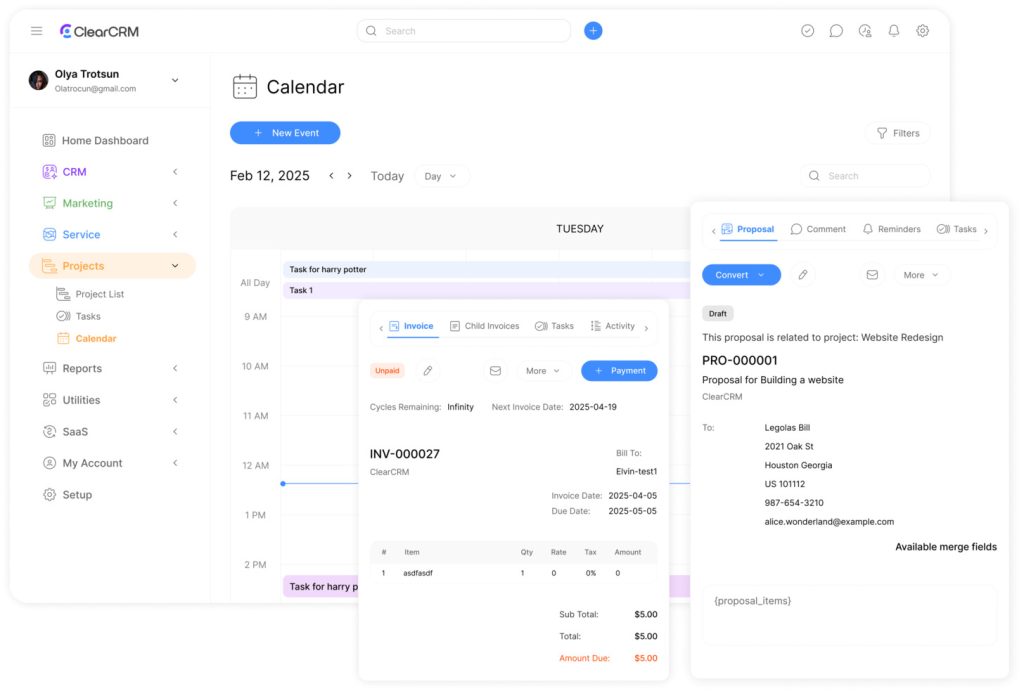
ClearCRM’s customization options allow supply chain businesses to tailor the system to their specific processes without requiring technical expertise. This flexibility, combined with affordable pricing that includes all features without hidden costs, makes it an ideal choice for supply chain operations of all sizes.
“ClearCRM has transformed how we manage our supply chain relationships. The unlimited pipelines and automation features have reduced our administrative work by 65% while improving customer satisfaction scores by 28%.”
Implementing a CRM for Supply Chain Management: Best Practices

Successfully implementing a CRM for supply chain management requires careful planning and execution. Here are key steps to ensure a smooth transition:
- Define Your Objectives: Clearly identify what you want to achieve with your CRM implementation, whether it’s improving customer communication, streamlining operations, or enhancing visibility.
- Map Your Processes: Document your current supply chain workflows and identify areas where the CRM can add value or eliminate inefficiencies.
- Prepare Your Data: Clean and organize your customer data before migration to ensure accuracy and completeness.
- Train Your Team: Provide comprehensive training for all users, emphasizing how the CRM will make their jobs easier and more effective.
- Start Small: Begin with core features and gradually expand usage as your team becomes more comfortable with the system.
Pro Tip: When implementing ClearCRM for supply chain management, take advantage of their free onboarding support to customize pipelines and automation workflows specifically for your supply chain processes.
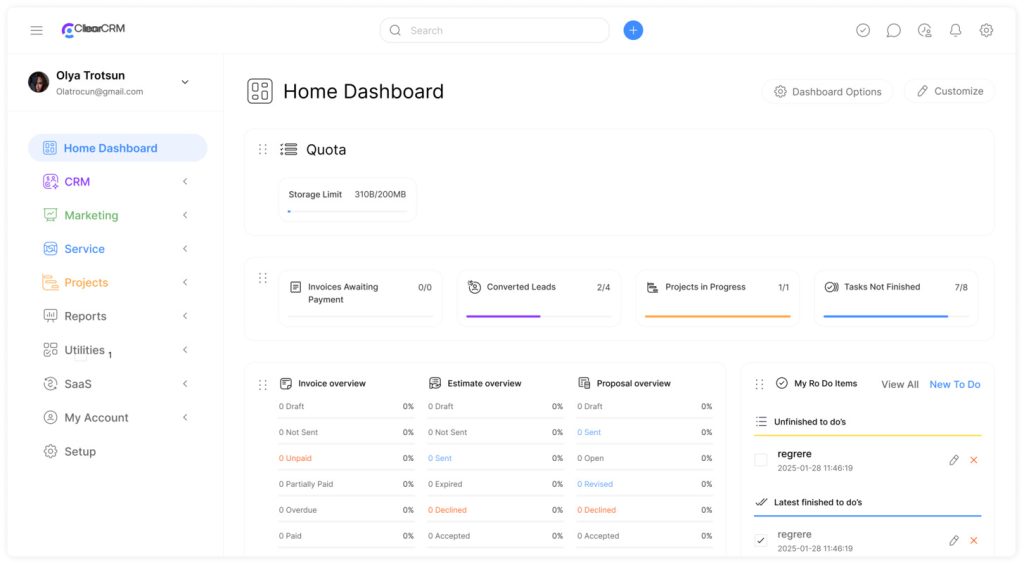
ClearCRM offers a streamlined implementation process designed specifically for supply chain businesses. Their team works with you to understand your unique workflows and configure the system accordingly, ensuring rapid adoption and maximum value.
Ready for a Smooth CRM Implementation?
ClearCRM’s dedicated onboarding team will guide you through every step of the process.
Maximizing ROI from Your Supply Chain CRM Investment
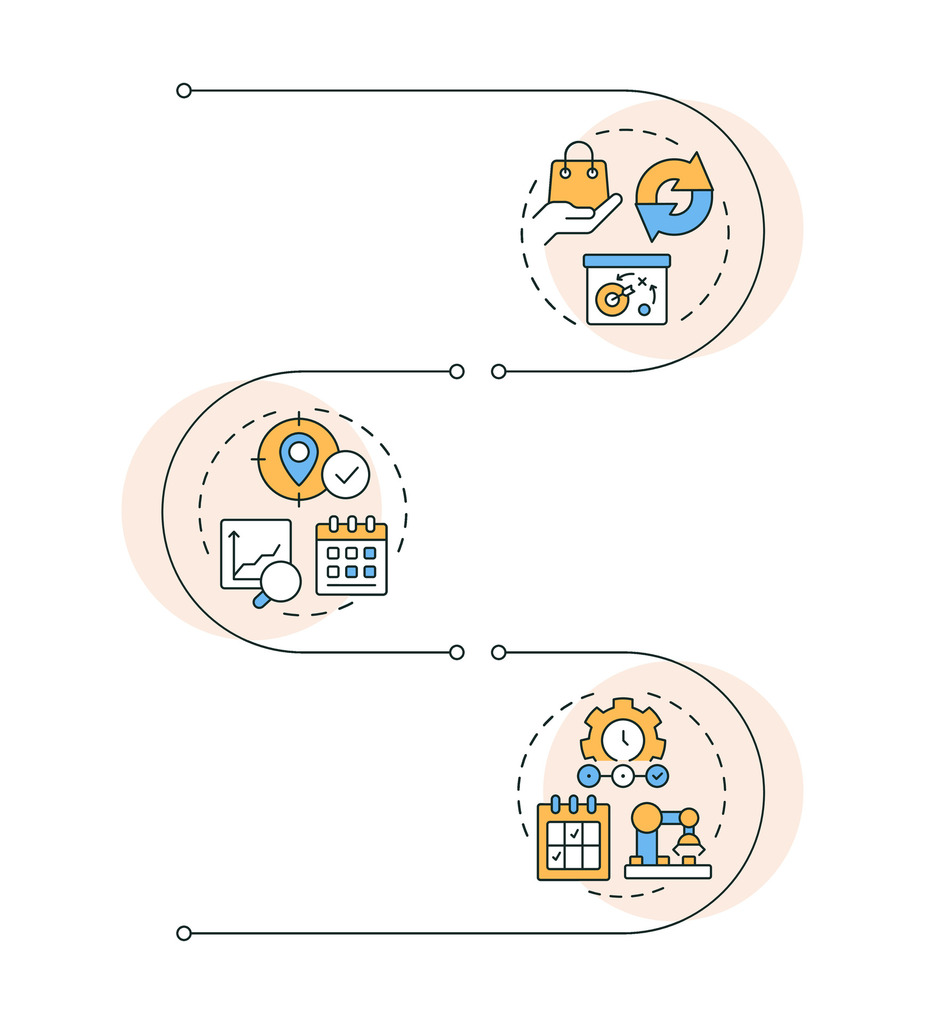
Investing in a CRM for your supply chain operations is just the first step. To maximize your return on investment, consider these strategies:
Measure the Right Metrics
Track KPIs that directly relate to your supply chain goals:
- Customer retention rates
- Order fulfillment accuracy
- Quote-to-close time
- Customer satisfaction scores
- Team productivity improvements
Leverage Automation
Identify repetitive tasks that can be automated:
- Follow-up communications
- Status updates to customers
- Internal notifications
- Report generation
- Task assignments
“After implementing ClearCRM, we’ve seen a 42% reduction in order processing time and a 35% increase in customer satisfaction. The unlimited pipelines allow us to create specialized workflows for different customer segments, dramatically improving our efficiency.”
ClearCRM’s focus on automation and customization makes it particularly effective for maximizing ROI in supply chain operations. By eliminating manual tasks and streamlining workflows, teams can focus on high-value activities that drive growth and customer satisfaction.

Conclusion: The Best CRM for Supply Chain Management in 2025
After thoroughly comparing the top CRM solutions for supply chain management, ClearCRM emerges as the clear leader for 2025. Its purpose-built features, unlimited pipelines, and powerful automation capabilities address the unique challenges faced by supply chain professionals.
While Jobber excels in field service management, ServiceTitan offers robust enterprise features, and HubSpot provides strong marketing capabilities, ClearCRM delivers the most balanced solution with built-in CRM capabilities that match the demands of modern supply chain workflows.

With its intuitive interface, customizable workflows, and affordable pricing, ClearCRM provides exceptional value for supply chain businesses of all sizes. Its focus on streamlining operations while enhancing customer relationships makes it the ideal choice for forward-thinking supply chain organizations in 2025.
What makes a CRM specifically suitable for supply chain management?
A CRM suited for supply chain management should offer features like extended pipeline management for longer sales cycles, integration with logistics systems, automated status updates, team coordination tools, and customizable workflows that match complex supply chain processes. ClearCRM excels in these areas with its unlimited pipelines and purpose-built automation capabilities.
How difficult is it to implement ClearCRM for a supply chain business?
ClearCRM is designed for straightforward implementation, with most supply chain businesses able to get up and running within days rather than weeks or months. The platform offers dedicated onboarding support to help configure pipelines and workflows specifically for your supply chain processes, minimizing disruption and accelerating time-to-value.
Can ClearCRM integrate with our existing supply chain systems?
Yes, ClearCRM offers integration capabilities with common supply chain and ERP systems. Its API access allows for custom integrations when needed, ensuring that your CRM can connect with your existing technology stack to provide a unified view of customer information and operational data.
Transform Your Supply Chain Management Today
Join the growing number of supply chain businesses that have improved efficiency, enhanced customer relationships, and driven growth with ClearCRM.
No credit card required. Full access to all features for 14 days.

